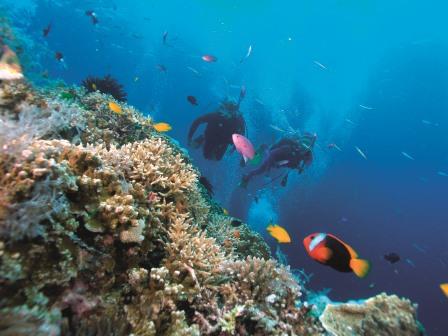New JCU marine study links dredging to diseased corals
In a world-first study published July 21, researchers say dredging activity near coral reefs can increase the frequency of diseases affecting corals.

“At dredging sites, we found more than twice as much coral disease than at our control sites,” says the lead author of the study, Joe Pollock, a PhD candidate from the ARC Centre of Excellence for Coral Reef Studies (Coral CoE) at James Cook University and the Australian Institute of Marine Science (AIMS).
In the past 20 years, the frequency of coral disease has risen across the world, and has become a significant factor in global coral reef decline. In the Caribbean, disease has diminished coral cover by as much as 95 percent in some locations.
This is the first study to examine the link between dredging and coral disease in nature. It was conducted near Barrow Island, off the West Australian coast. The site is close to where an 18-month, 7-million cubic metre dredging project took place, developing a channel to accommodate ships transporting liquefied gas to a nearby processing plant. The site was in otherwise very good condition.
“Turbidity and sedimentation are critical pressures on the health of coral reefs and are affected by many human activities, especially in the coastal zone,” Schaffelke says. “What this study does is highlight a direct link between coral disease and sedimentation and turbidity.”
Coastal industries provide economic stability, food security and reliable energy to billions of people around the world. As the pace of coastal development and demand for larger harbours escalates, the impact of elevated sediment and turbidity on the health of marine species is now a worldwide concern.
“Dredging is a pressing issue on many coral reefs throughout the world, including the Great Barrier Reef,” says Pollock.
“A solid understanding of the impacts of dredging, sediment and turbidity on coral health will be indispensable in the development of well-informed management and monitoring strategies for vulnerable coral reef ecosystems,” he concludes.
About Marine Biology at JCU
JCU, through its School of Marine and Tropical Biology, is the first university in Australia to offer specialized training in marine biology. It has earned an international reputation for excellence in both teaching and research and takes a field-oriented, hands-on approach to its teaching and research endeavours.
The school’s location in the tropics allows students and research staff ready access to a wide variety of tropical marine systems including coral reefs, tropical estuaries, mangrove habitats and seagrass beds. Links between JCU’s research and teaching programs ensure that students are at the cutting edge of marine research.
Master of Science (Marine Biology and Ecology)
Marine Biology at JCU excels in the study of tropical shallow water marine systems with emphasis on coral reefs and surrounding waters, seagrass, mangrove assemblages and the adjacent sandy and rocky shores. The course enable graduates to develop their knowledge and skills in quantitative marine ecology, conservation biology, and the biology, life history and taxonomy of tropical marine organisms.
Entry requirements: Completion of a recognised, appropriate undergraduate degree attaining a minimum of 65% or equivalent prior learning including appropriate professional experience.
Apply to James Cook University!
*

































Ask A Question
Ask us about your program of interest, or if you have a question about our services.
CONTACT US TODAY